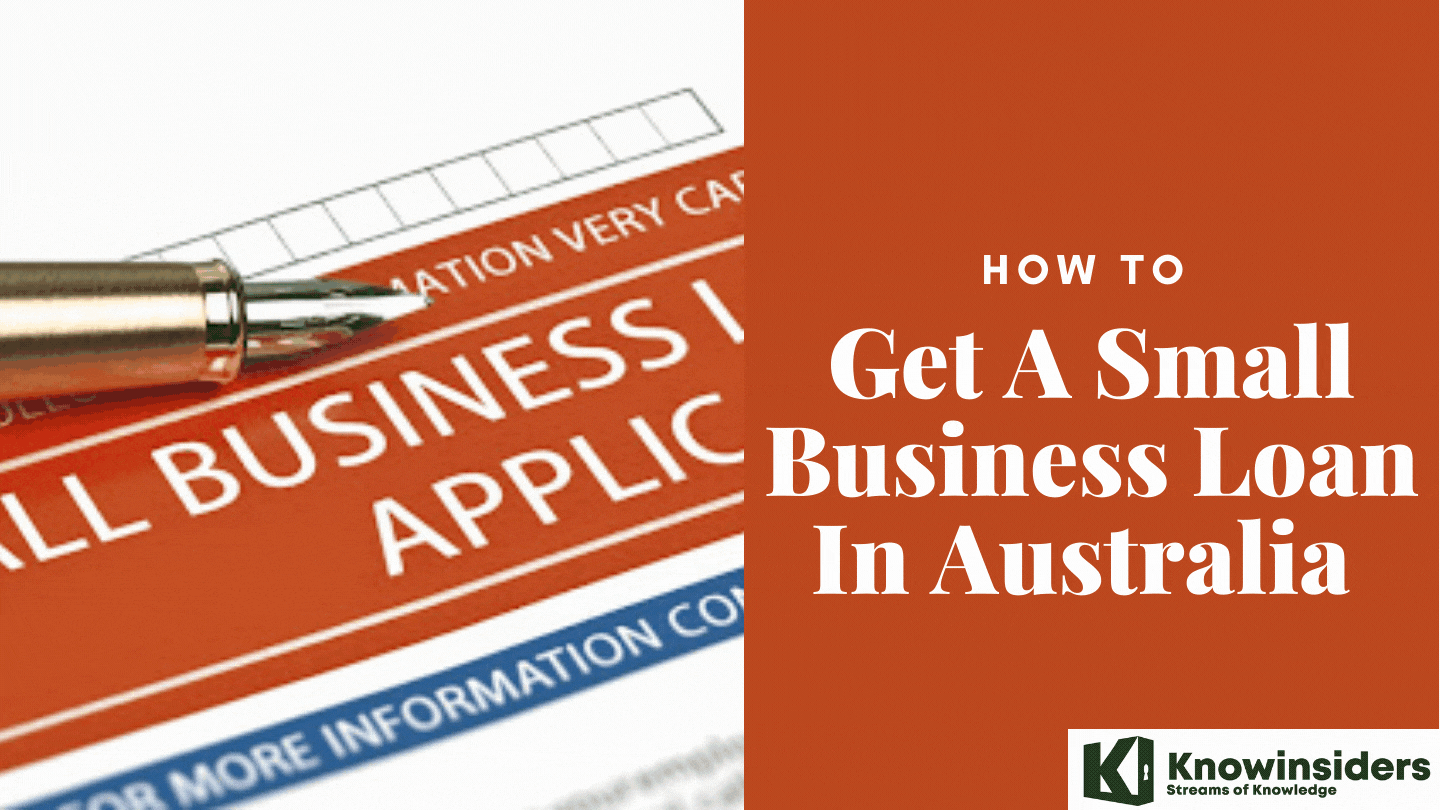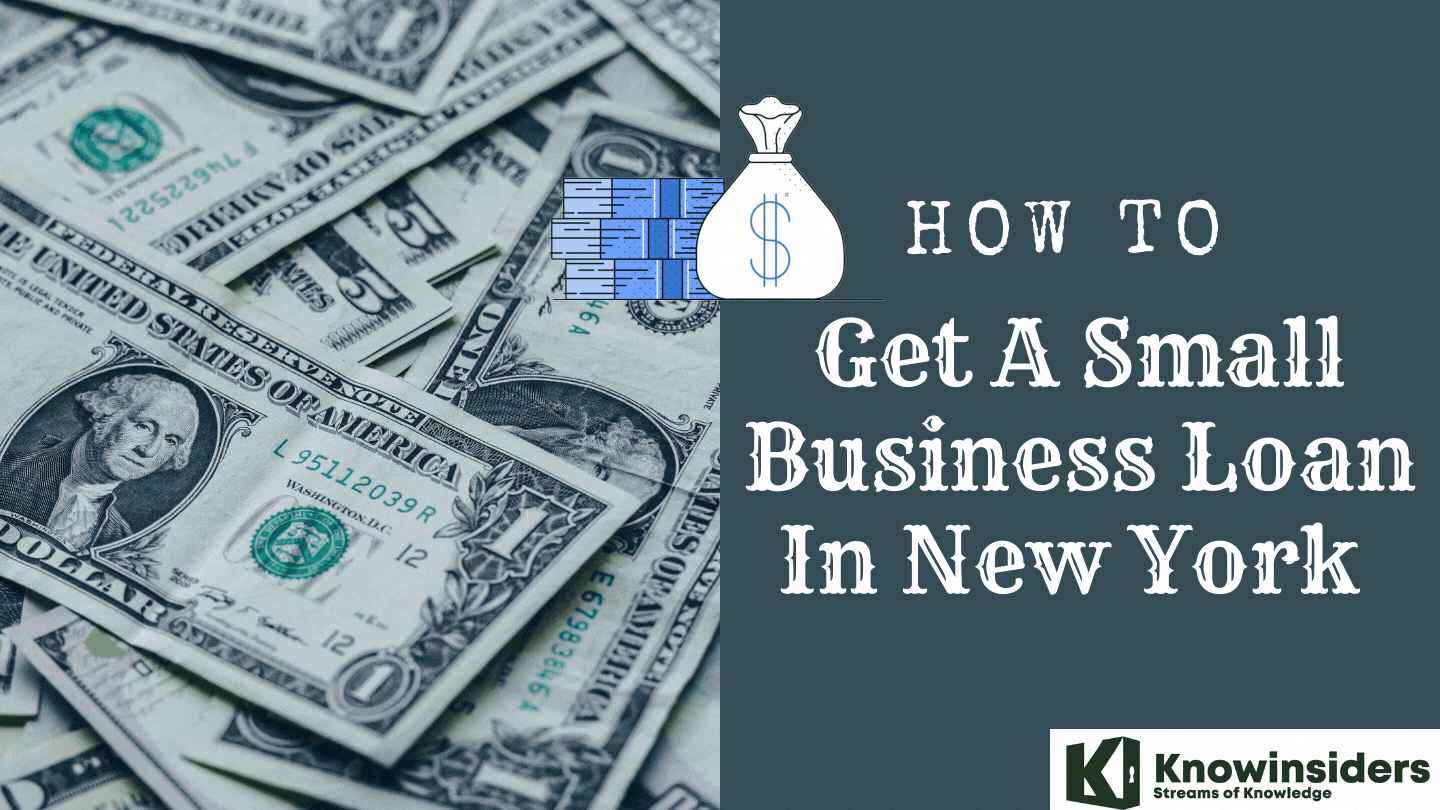The Complete Guide To Get A Small Business Loan In the U.S Today
 |
| How To Get A Small Business Loan In America |
| Contents |
With the help of a small business loan, entrepreneurs can meet the capital and working capital needs of their businesses. The best small business loans can provide you with access to the capital you need to start or expand your business. This article explains how to apply for and receive the small business loan that is currently available in the United States.
Small business loans are useful for both starting a business and growing an existing one. Your company may be able to weather the storm of the coronavirus pandemic with the help of small business financing. The SBA Paycheck Protection Program and other loan programs from the Small Business Administration and direct lenders can provide much-needed working capital loans and other financial support when times are tough.
How Small Business Loans Work in America?
Loans for small businesses are useful for financing major purchases and meeting other operating expenses. The money from a loan can be put toward a specific expense or used to better manage cash flow, and it must be repaid with interest at some point in the future. However, if you need access to cash on an as-needed basis, there are other types of small business loans, such as lines of credit, merchant cash advances, and invoice financing.
The best loan for a business will be determined by several factors, such as the company's creditworthiness, the amount of money it needs to borrow, the intended use of the money, and the urgency with which it needs the money.
Types of Business Loans In America
A business line of credit, invoice factoring, and merchant cash advances are just some of the many forms of small business loans available. Which one is best for your company will depend on when and why you need the funds.
1. Term loans
A typical type of business financing is a term loan. You receive a lump sum of money up front that you pay back over a specified period of time with interest.
Online lenders can offer funding more quickly than banks that offer small-business loans because they offer term loans up to $1 million.
Pros:
Get money up front to put into your company.
allow you to borrow more money on average than other kinds of loans.
If you use an online lender instead of a traditional bank, funding happens quickly—typically within a few days to a week as opposed to up to several months.
Cons:
May need a personal guarantee or collateral, which is an asset that the lender can sell if you default, like real estate or business equipment.
There can be differences in costs; term loans from online lenders typically have higher costs than those from conventional banks.
2. SBA loans
These loans, which are provided by banks and other lenders, are backed by the Small Business Administration. Depending on how you intend to use the funds, SBA loan repayment schedules may vary. For working capital, they range from seven years to ten years to buy equipment, and from 25 years to buy real estate.
Pros:
- Some of the lowest rates on the market.
- You can borrow up to $5 million.
- Long repayment terms.
Cons:
- Hard to qualify.
- Long and rigorous application process.
3. Business lines of credit
With a business line of credit, you can draw money up to your credit limit, and you only pay interest on that money. In comparison to a term loan, it may offer more flexibility.
Pros:
- Flexible way to borrow.
- Typically unsecured, so no collateral is required.
Cons:
- May carry additional costs, such as maintenance fees and draw fees.
- Strong revenue and credit required.
4. Equipment loans
Equipment loans, which occasionally include financing for semi trucks, assist you in purchasing equipment for your company. Cars, vans, and light trucks are eligible for business auto loans. The term of an equipment loan is frequently matched to the equipment's anticipated lifespan, and the equipment is used as collateral for the loan. The cost of the equipment and the viability of your business will affect the rates.
Pros:
- You own the equipment and build equity in it.
- You can get competitive rates if you have strong credit and business finances.
Cons:
- You may have to come up with a down payment.
- Equipment can become outdated more quickly than the length of your financing.
5. Invoice factoring
Consider that your company has unpaid customer invoices that should be paid within 60 days. You can use invoice factoring to get money for those unpaid invoices if you urgently need cash.
You would sell the invoices to a factoring business, and that business would be in charge of obtaining payment from the client when the invoice was due.
Pros:
- Fast cash for your business.
- Easier approval than traditional funding options.
Cons:
- Costly compared with other options.
- You lose control over the collection of your invoices.
6. Invoice financing
Invoice financing is similar to invoice factoring, but instead of selling your unpaid invoices to a factoring company, you use the invoices as collateral to get a cash advance.
Pros:
- Fast cash.
- Your customers won’t know their invoice is being financed.
Cons:
- Costly compared with other options.
- You’re still responsible for collecting the invoice payment.
7. Merchant cash advances
You receive a one-time lump sum of money to use as business financing.
As opposed to making a single fixed payment from a bank account every month as you would with a term loan, payments on a merchant cash advance are made either by deducting a set percentage of your daily credit and debit card sales or by making set withdrawals from a bank account every day or every week.
Pros:
- Fast cash.
- Unsecured financing.
Cons:
- Some of the highest borrowing costs — up to 350% in some cases.
- Frequent repayments can create cash flow problems.
8. Personal loans
A personal loan can be used for business purposes. Banks typically don't lend to companies with no operating history, so it's a possibility for startups.
You must have good credit to be eligible for these loans because approval is solely based on your own credit score.
Pros:
- Startups and newer businesses can qualify.
- Fast funding.
Cons:
- High borrowing costs.
- Small borrowing amounts of up to $50,000.
- Failure to repay can hurt your credit.
9. Business credit cards
Revolving credit lines are business credit cards. As long as you make the required minimum monthly payments and don't go over the credit limit, you can use and repay the card as necessary.
They work best when used to pay for ongoing expenses like transportation, office supplies, and utilities.
Pros:
- Earn rewards on your purchases.
- No collateral is required.
Cons:
- High cost, with a variable rate that may rise.
- Extra fees may apply.
10. Microloan
Microloans are small loans — $50,000 or less — offered by nonprofit organizations and mission-based lenders.
These loans typically are available to startups, newer businesses and businesses in disadvantaged communities.
Pros:
- Low cost.
- Other services may be provided, such as consulting and training.
Cons:
- Smaller loan amounts.
- You may have to meet stringent eligibility requirements.
How to get a small-business loan from a bank in America
An existing relationship. The majority of banks demand that you have at least a business checking account with them. At some banks, you only need to open an account to meet this requirement, but other banks prefer a long-term partnership. For instance, in order to be eligible for financing, you must have an account with Wells Fargo for at least a year.
Good credit. A personal credit score of at least 700 is probably required. Too much debt, too many open accounts, or poor credit history, such as missed payments, loan defaults, and bankruptcies, could all be potential deal-breakers. The bank will look for similar red flags when reviewing your business credit score.
Strong revenue. When you apply for a small business loan, the bank will examine your company to determine whether it is healthy and has enough revenue to support the amount you are borrowing. For instance, Bank of America requires at least $100,000 in annual revenue for its unsecured business loans; $200,000 is required for its secured loans.
Enough time in business. The norm is two years under the same ownership. There are, however, exceptions in both directions. For instance, PNC Bank typically requires at least three years of operations before you qualify, whereas some U.S. Bank lending products are available after six months in business.
Collateral. To obtain a bank loan, you are not required to put up business collateral like real estate or machinery. Unsecured and secured business loans are provided by some banks. But in order to make payments more manageable, the bank may offer larger funding amounts for secured loans along with longer terms and lower interest rates.
Read More: How To Get A Small Business Loan: Best Tips for Startup Success
How to Qualify for a Small-Business Loan In The Unites States?
The time it takes to get a small business loan can add up. It's easier to avoid aggravation if you know up front whether or not you'll meet a lender's requirements.
The following are five guidelines to help you get approved for a small business loan in the United States:
1.Build personal and business credit scores
Your ability to repay personal debts like credit card balances, auto loans, and mortgages is indicated by your personal credit score. A personal credit score is required by small-business lenders because they want to know how you handle debt.
The higher the FICO score, which is frequently used to make lending decisions, the better. NerdWallet offers free credit scores, and AnnualCreditReport.com offers free copies of credit reports.
You can quickly repair your credit by disputing any errors in your report and making on-time, full payments on all of your bills.
More established businesses will have business credit scores with credit bureaus like Experian, Equifax, and Dun & Bradstreet, which typically range from 0 or 1 to 100. Establishing trade lines and maintaining accurate public records are steps to establishing business credit.
To be eligible for a small business loan from a traditional bank or an SBA loan backed by the government, you'll likely need to have excellent business credit as well as good personal credit. Online lenders might be more forgiving with credit scores, focusing instead on the cash flow and track record of your company.
2.Know the lender’s minimum qualifications and requirements
To be eligible for a business loan, you typically must meet minimum requirements relating to credit scores, annual revenue, and years in business; however, some lenders may be flexible if you perform poorly in one area but exceptionally well in another.
Depending on the type of business loan you want, qualifications may also change. For instance:
→ You must operate as a for-profit business, meet the SBA's definition of a "small" business, and not be an ineligible business, such as a life insurance company or a financial institution like a bank, to qualify for loans backed by the U.S. Small Business Administration. You must also be current on all federal loans and have no prior defaults in order to qualify; for example, if you have late payments on federal student loans or government-backed mortgages.
→ For business loans from banks and online. Online loans have less stringent requirements than traditional loans because they are underwritten differently by online lenders and banks. For instance, some online lenders provide business loans for people with bad credit or might accept startups. On the down side, a more expensive loan is frequently paired with this ease of qualification.
3.Gather financial and legal documents
When you apply for a small business loan, banks and other traditional lenders typically demand a ton of paperwork. You might require the following financial and legal records to apply for a small business loan:
Returns on personal and business income taxes.
Income statement and balance sheet.
Bank statements for both individuals and companies.
your driver's license photograph.
leases for businesses.
business permits.
Constitutional documents.
a resume demonstrating relevant managerial or commercial experience.
financial forecasts if your operating history is short.
A streamlined application process with fewer documents and quicker underwriting may be offered by online lenders. Some online lenders might offer you interest rates similar to bank loans if you have good credit and robust business finances.
When applying for a business loan, make sure to shop around to find the most affordable loan that meets your company's requirements.
4.Develop a strong business plan
Lenders will inquire about your intended use for the funds and inquire as to your strong repayment capacity. They might ask for a thorough business plan that outlines the loan's goals and how you expect it to boost profits.
The following should also be in your business plan:
Business description.
Description of the product or service.
a management group.
a study of the industry.
Plan for facilities and operations.
projected and current financial data.
marketing, sales, and promotion plans.
Strengths, Weaknesses, Opportunities, and Threats (SWOT) analysis.
Your business plan should unambiguously show that you will have enough cash flow to pay both the new loan payments and ongoing operating costs. This may increase the lender's trust in your company and raise the likelihood that the loan will be approved.
5.Provide collateral
You might need to offer collateral to back the loan in order to be approved for a small business loan. Business collateral is an asset that the lender may seize and sell if you are unable to make your payments, such as machinery, real estate, or stock. It's a way for lenders to get their money back if your company fails.
For instance, collateral and a personal guarantee from each owner of 20% or more of the business are required for SBA 7(a) loans over $25,000. Your credit rating and other personal assets are at risk when you sign a personal guarantee.
Even though they don't require collateral, some online lenders might want a personal guarantee. Others may place a general lien on your company's assets, which effectively acts as additional collateral and gives the lender the right to seize company assets (such as real estate, stock, and equipment) in order to recover an unpaid loan. Ask questions if you're unclear about the requirements because each lender has their own rules.
Where Are Small-Business Loans Available in America?
Banks, credit unions, online lenders, and alternative lenders all offer small-business loans. Recognize what you can anticipate from each.
credit unions and banks. Small businesses, as well as larger, more established ones, are frequently catered to by banks and credit unions. If the loan is supported by the Small Business Administration, you'll stand a better chance of receiving funding from a conventional bank. SBA loan programs can make it simpler to be approved for a small-business loan and lower the risk for the lender. If you already have a working relationship with the lender, such as a business bank account, approval might be simpler.
lenders online. Online small-business lenders frequently provide services akin to those provided by banks and credit unions, but without a physical location. Online applications for term loans, lines of credit, and other small-business financing options should be quick and simple. As their loan products are less regulated than those of commercial banks, some online lenders are regarded as alternative lenders and offer more flexibility than those of those banks. Alternative lenders offer loans to borrowers who might not otherwise be able to obtain small-business financing, such as start-ups or companies with a dubious credit history.
According to S. Michael Sury, a lecturer in finance at the University of Texas at Austin, "Small businesses should be aware there are multiple channels available for borrowing needed funds."
Possibly available online are SBA loan programs. Peer-to-peer small-business lenders are also available online, connecting your company with a number of investors who typically have a diversified loan portfolio made up of modest-sized loans. Peer-to-peer small business lending criteria are typically less strict than those at conventional brick-and-mortar banks, but because lending to small businesses through P2P marketplaces carries a higher risk for lenders, interest rates frequently start out higher than those on conventional business loans.
Best Banks for Small-Business Loans in America
1. Bank of America
The Bank of America Corporation is an American multinational investment bank and financial services holding company with its headquarters in Charlotte, North Carolina. It is also known simply as Bank of America and is frequently abbreviated as BofA or BoA. The bank was established in San Francisco, and NationsBank of Charlotte purchased it in 1998, giving it its current shape. It is the eighth largest bank in the world and the second-largest bank in the United States, behind JPMorgan Chase. One of the Big Four U.S. banking organizations is Bank of America. It competes directly with JPMorgan Chase, Citigroup, and Wells Fargo for the roughly 10.73% of all bank deposits in the United States. Commercial banking, wealth management, and investment banking are its three main financial services.
Both fixed-rate secured and unsecured term loans are available from Bank of America. Its secured loan has a higher income requirement: $250,000 as opposed to $100,000 for the unsecured choice. But it provides greater borrowing options, up to $250,000, as well as a potential interest rate reduction. Both small business loans have minimum two-year business requirements and have shorter repayment terms—up to five years—than what other banks might provide.
Similar to its term loans, Bank of America also provides secured and unsecured business lines of credit. The secured line of credit has a higher borrowing limit, with a starting amount of $25,000 as opposed to the unsecured option's $10,000. There is no predetermined borrowing cap. Both have revolving terms that renew annually and allow you to use the money as needed.
2. JPMorgan Chase
The consumer and commercial banking division of the American multinational banking and financial services holding company, JPMorgan Chase, is JPMorgan Chase Bank, N.A., also known as Chase Bank or simply as Chase. Its headquarters are in Manhattan, New York City. Chase Manhattan Bank was the name of the institution up until its 2000 merger with J.P. Morgan & Co. In 1955, the Chase National Bank and the Manhattan Company merged to form the Chase Manhattan Bank. In 2004, the bank merged with Bank One Corporation, and later it took over the majority of Washington Mutual's assets and deposits.
Chase offers commercial and business credit lines. Its business line of credit has a five-year renewable revolving term and offers funding ranging from $10,000 to $500,000. Commercial lines start at $500,000 and have terms of one to two years that can be extended.
Chase finances a variety of SBA loan types and is an SBA-preferred lender. This includes credit lines and SBA Express loans, which provide quicker funding of up to $350,000.
3. Citibank
The consumer arm of financial services giant Citigroup is called Citibank. As the City Bank of New York, Citibank was established in 1812 and later changed its name to First National City Bank of New York. The bank has 1,494 branches in Mexico run by its subsidiary Banamex and 2,649 branches worldwide, including 723 branches in the United States. The six major cities of New York, Chicago, Los Angeles, San Francisco, Washington, D.C., and Miami are home to the majority of the U.S. branches.
Two business lines of credit from Citibank are available in amounts ranging from $10,000 to $3 million. Both lines have revolving terms, variable interest rates, and call for a personal guarantee.
4. Wells Fargo
An American multinational financial services company called Wells Fargo & Company has its corporate headquarters in San Francisco, California, its operational headquarters in Manhattan, and it has managerial offices both domestically and abroad. With operations in 35 countries and more than 70 million customers worldwide, the company. The Financial Stability Board regards it as a systemically important financial institution.
Three different credit lines, one unsecured and two secured by collateral, are available from $5,000 to $500,000 at Wells Fargo. Up to $100,000 in revolving, variable-rate credit lines are available. The term for those with values over $100,000 is one year. For Wells Fargo's most generous business line of credit, you'll typically need at least $2 million to $5 million in annual sales. By product, fees differ.
5. U.S. Bank
In comparison to Bank of America and Wells Fargo, U.S. Bank has fewer physical locations. U.S. Bank, however, might be a good option for startups with collateral if there is a branch nearby, as you might be able to qualify for an SBA loan with less than a year in business.
Loans with a set term. Up to $1 million in fixed-rate, secured term loans are available from U.S. Bank. There isn't an unsecured business loan for it. The bank offers a more expedient version of its term loan product if you require quick access to working capital. Although the Quick Loan application process is quicker, it has a lower borrowing cap ($250,000). Companies with a minimum of two years in operation are preferred.
Credit lines for businesses. The business line of credit from U.S. Bank also has an interest-only payment option and a $1 million maximum. For businesses that have been in operation for at least two years, the bank offers a revolving line of credit called CashFlow Manager that has a maximum credit limit of $250,000. If the line of credit is less than $50,000, there is a $150 annual fee for that product.
 How To Get A Business Loan With Bad Credit How To Get A Business Loan With Bad Credit As a business owner or entrepreneur, there’s a good chance you’ll be looking for funding at some point in the life of your business. Read ... |
Alternatives to bank business loans
If a large bank won't lend you money for your business, look into these other options:
Neighborhood banks. According to a 2020 Federal Reserve survey, business loan applicants report higher approval rates with smaller banks than big-name financial institutions, as well as greater overall satisfaction. The number of community banks is dwindling, and a neighborhood bank might not offer the features you need, such as multiple locations or online loan management.
lenders online. Compared to bank loans, online business loans have higher approval rates and faster funding. Even some online lenders have a focus on lending to small businesses. For instance, according to loan volume, Live Oak Bank is the busiest SBA 7(a) lender as of September 2020. Online lenders may also be able to fund newer businesses because they are less likely to need traditional collateral. But the price will probably be higher than what a conventional bank charges.
Microlenders. Microloans are available from nonprofit institutions, and they may be a good option for new or small businesses that require working capital but cannot obtain a bank business loan. Microloans typically have low maximum amounts ($50,000) and short repayment periods. Additionally, they will probably have higher costs than a bank business loan.
Who Can Apply for a Small-Business Loan?Not every small-business lender provides loans to every kind of company. You must persuade the lender that the risk is worthwhile for your company. You must have good credit, a strong business plan, and be aware of how much your company needs to borrow in order to understand your eligibility. Analyze your company's funding requirements. Analyze your company's expenses and decide how much you can afford to pay toward a loan. Your company's ability to repay a loan can be determined by calculating your debt service coverage ratio. The equation is straightforward: DSCR = Net Operating Income / Total Annual Debt. Lenders prefer to work with borrowers who have a ratio of at least 1.0. This indicates that your monthly loan payment and cash flow are equal. However, lenders prefer a 1.35 DSCR because having a small buffer is ideal. Your DSCR, for instance, would be 1.35 if your annual net operating income was $135,000 and your total debt was $100,000. Verify your credit rating. An essential component of the small-business loan application process is your personal credit score. Although your business credit score may also be used if you have one, lenders frequently take into account your personal credit, particularly when considering startup business loans. The required credit score for approval varies, but generally speaking, the better repayment terms and lower interest rates you'll get on a small-business loan the higher your credit score. Before starting the application process, it's crucial to remove credit errors. According to Rod Griffin, director of public education for Experian, one of the three major consumer credit bureaus, "As a sole proprietor, your personal credit may be taken into account in the application for a business loan if you are using personal credit to secure the business debt." It's fairly typical for a small-business owner to act in this way. Remember that if the loan was obtained using your personal credit, not repaying it could harm your record and limit your future access to credit. Make a convincing business plan. Your small business's foundation is a strong, thorough business plan that demonstrates your financial projections to potential lenders. Lenders will demand to see your projected balance sheets and revenue and cost estimates for at least two years. |
 How To Get A Small Business Loan In Australia How To Get A Small Business Loan In Australia If you are looking for ways to begin your business in Australia, it is important and necessary to understand what a small business loan is ... |
 How To Get A Small Business Loan In The UK How To Get A Small Business Loan In The UK If you are wanting to open a business in the UK, this guide will help you solve your problems with small business loans and possible ... |
 How To Get A Business Loan With Bad Credit How To Get A Business Loan With Bad Credit As a business owner or entrepreneur, there’s a good chance you’ll be looking for funding at some point in the life of your business. Read ... |
 How To Get A Small Business Loan: Best Tips for Startup Success How To Get A Small Business Loan: Best Tips for Startup Success Money is important if you want to start your business, which small business loan will help with that. To better understand what it is and ... |


























